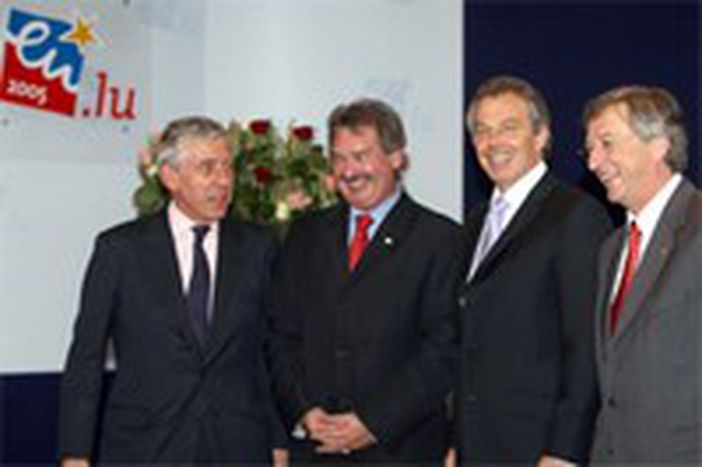
Tony Blair to the rescue?
Published on
Translation by:
 ingrid su
ingrid su
If the recent summit in Brussels has further deepened the crisis in the EU, Blair has emerged as the strong man capable of sorting out Europe’s problems. Will an injection of liberalism revive the machine?
The French rejection of the European constitution on May 29 was allegedly to save the EU from Anglo-Saxon ultra-liberalism and to defend the floundering continental welfare model. But instead, it has created a situation which will allow Tony Blair to have a long-lasting influence on the direction of European integration. This irony was clearly demonstrated on the day of the French No, when it was British MPs who applauded the French people for having rejected the Treaty.
Blair almighty
The direct consequence of this rejection of a politically united Europe is that Tony Blair has become the most influential political leader of the EU. Blair, the first Labour Prime Minister to be re-elected for a third term, is not worried about staying in power since he has already announced that he will not stand for election again. Thus he begins a strategic presidency of the European Union with traditional partners who have been politically weakened. Indeed, after 10 years at the top in France and with a largely useless social and economic record, Jacques Chirac will go down in history as the one who put a stop to 50 years of European integration. As for German Chancellor Gerhard Schröder, after a series of punishing electoral defeats, he will probably leave his post in September to Angela Merkel, leader of the right-wing CDU. She is likely to become the first Chancellor from the ex-German Democratic Republic (GDR), or East Germany, and will be much more attuned to the Anglo-Saxon economic model than her predecessor has been.
Blair the trickster
In light of this exceptionally favourable political context, Tony Blair finds himself in a position to model the EU along his lines. The agenda of the British presidency, which has been circulating for several months, offers a good idea of how Blair wants the EU to turn out. Among his priorities are Turkey’s entry to the EU, reinforcement of competition and the liberalisation of services. Growth in the competitiveness of European enterprises is also high up on the list, notably by permitting more flexibility in the work market. In short, he plans to create a vast zone of free exchange, independent of political ambitions.
Thus, in rejecting the ‘market economy’ proposed by the constitution, the French nationalist Left will perhaps precipitate the arrival of a new European ultra-liberalism. The consequence of this sad paradox could be the reinforcement of the populist and nationalist tendencies which are already strongly present in certain member states. Such a scenario, however, is not very likely and those who think it is are underestimating Blair’s political ability. He is convinced that this is a historical opportunity for him and the UK to change their image as the black sheep in Europe to that of the saviour of the European Union. Having reassured his countrymen that, at present, their Kingdom is no longer threatened with becoming a decentralised province of the EU, Blair has also been spared political sanction at the public’s hands during the course of a referendum on the constitution. Thus, his pro-European ideas can be given free reign.
Blair the opportunist
Since the old Franco-German dream of a European superpower has been pushed to the back burner for the foreseeable future, the moment has come for Blair to put an alternative vision into practice, a European “third way”. Even if the concept of common law makes it hard for the British to accept the idea of a written constitution, Blair will try to save certain elements of the European constitution. As an opportunist, the Prime Minister remains convinced that in matters of defence, it is necessary to pursue the efforts of integration made since the Anglo-French summit in Saint-Malo in 1998. The EU must assert itself as a credible and incontrovertible military ally of the United States. As for European foreign policy, the introduction of a diplomatic service could also be saved. Finally, Jack Straw, Britain’s Foreign Secretary, has confirmed that the reinforcement of the role of national parliaments and the principle of subsidiarity are to be maintained, regardless of the outcome of the constitutional treaty.
Blair has also attempted to respond to the fears expressed by the French and Dutch referendums, stating: “Of course we need a social Europe. But it must be a social Europe that works." For him, it is important to renew the debate by transcending the opposing continental and Anglo-Saxon paradigms, and to pursue the reforms recommended by the Lisbon Strategy. Despite the favourable political context, Blair knows that in order to carry out his project efficiently he needs to bring together the other members. Therefore, he will have to be careful not to revive the tensions between Old and New Europe sparked by negotiations at the Treaty of Nice and the war in Iraq. Will the legendary British pragmatism be enough to prepare the ground for the renewal of European integration?
Translated from Tony Blair, au secours de l’Union européenne ?


